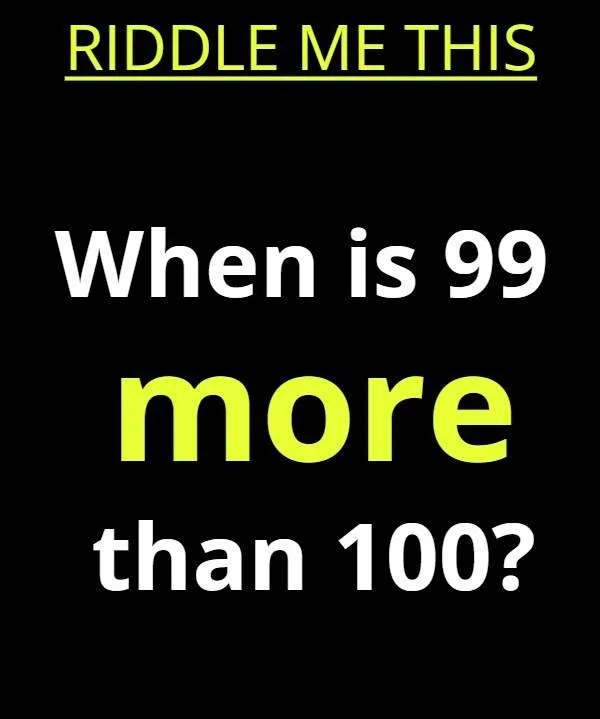Sometimes, the simplest riddles turn out to be the most perplexing. One riddle that has taken the internet by storm is deceptively straightforward yet brilliantly tricky. It goes like this:
“When is 99 more than 100?”
At first glance, you might think there’s no way 99 could ever be greater than 100. After all, basic math tells us that 100 is clearly more than 99. But this riddle isn’t about numbers in the traditional sense—it’s about context and interpretation. Ready to find out the mind-blowing answer?

The Big Reveal: It’s All About the Microwave!
The answer to this riddle lies in something most of us use daily: a microwave timer!
Here’s how it works:
- On most microwaves, if you set the timer to 99, it counts down 1 minute and 39 seconds (99 seconds).
- However, if you set the timer to 100, it counts down 1 minute (60 seconds).
Surprising, right? In the context of a microwave timer, 99 seconds (1:39) is actually longer than 100 seconds (1:00).
Video: “Prove” 90 Equals 100. Can You Find The Mistake?
Why Do Microwaves Work This Way?
Microwaves use a digital timer that typically reads seconds for numbers under 100 and minutes and seconds for numbers 100 and above. When you enter 99, the microwave interprets it as 99 seconds (1 minute and 39 seconds). When you enter 100, it reads it as 1 minute.
It’s a quirky programming detail that makes perfect sense once you know how it works, but it’s not exactly intuitive. Most people don’t think about how their microwave interprets numbers—they just punch in the time and hit start.

The Psychology Behind the Trick
This riddle works so well because it challenges how we naturally think about numbers. Our brains are hardwired to see 100 as greater than 99—no questions asked. The key to solving the riddle is stepping back and thinking beyond simple math.
Riddles like this force us to break free from our usual way of interpreting numbers. Instead of seeing 99 and 100 purely as numerical values, we have to view them as time entries on a microwave. It’s a clever twist that makes this riddle so memorable.
Other Riddles That Mess With Your Mind
If you enjoyed the 99 vs. 100 riddle, you’ll love these similar brain teasers that also play with perception:
- “What has keys but can’t open locks?” (Answer: A piano)
- “The more you take, the more you leave behind. What am I?” (Answer: Footsteps)
- “I speak without a mouth and hear without ears. I have no body, but I come alive with the wind. What am I?” (Answer: An echo)
Just like the microwave riddle, these puzzles challenge us to think beyond the literal and consider the abstract. They’re a great reminder that not everything is as straightforward as it seems.
Why Do We Love Riddles Like This One?

Part of the appeal of riddles is that they make us feel clever when we finally figure them out—or at least make us laugh when we hear the answer. The microwave riddle is particularly satisfying because it plays on our everyday experiences in a surprising way.
We don’t usually think about how a microwave’s timer works in such detail. We just punch in the numbers and expect it to heat our food. That’s why this riddle works—it takes something familiar and reveals a hidden quirk that catches us off guard.
Why Riddles Are Good for Your Brain
Riddles like this aren’t just fun—they’re also good for your brain. Solving them requires creative thinking, problem-solving skills, and mental flexibility. When you encounter a riddle that challenges your assumptions, it pushes you to think in new and unexpected ways.
Studies show that solving puzzles and riddles can improve cognitive function, boost problem-solving abilities, and even reduce stress. So, next time you’re stumped by a tricky riddle, remember that your brain is getting a little workout!
The Fun of Sharing Riddles with Friends

One of the best things about this riddle is how it makes people think. You can share it with friends and watch their faces as they struggle to figure it out. It’s especially fun to drop hints like, “Think about something you use every day,” or “It’s in your kitchen.”
The moment of realization is always priceless—the sudden lightbulb moment when they get it. It’s a reminder that sometimes, the answer is right in front of us, but we just need to change our perspective.
Final Thoughts: Why the Microwave Riddle Stands Out
The riddle “When is 99 more than 100?” is brilliant because it plays with how we interpret numbers in a real-world context. It’s not just about math—it’s about how everyday objects like microwaves can defy our expectations.
By making us rethink how a simple number can mean different things in different settings, this riddle challenges our logic and makes us laugh at our own assumptions. It’s a perfect example of how riddles can be both entertaining and intellectually stimulating.
Next time you’re heating up leftovers, take a moment to appreciate the quirky way your microwave handles time. And remember—99 really can be more than 100, as long as you’re looking at the microwave timer!


